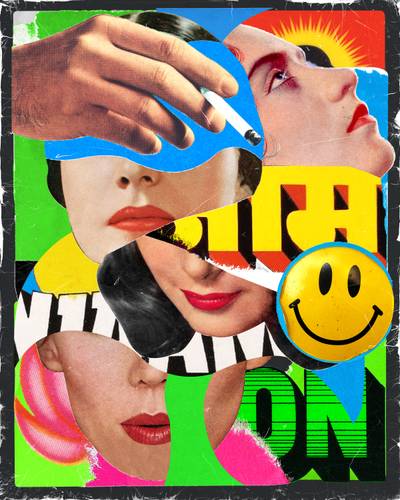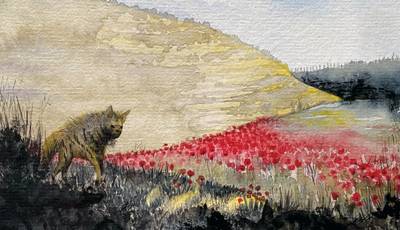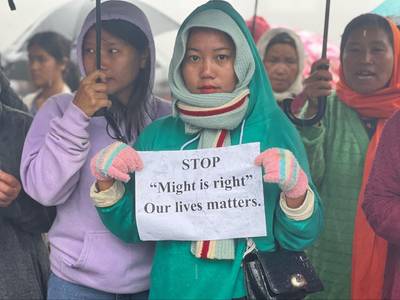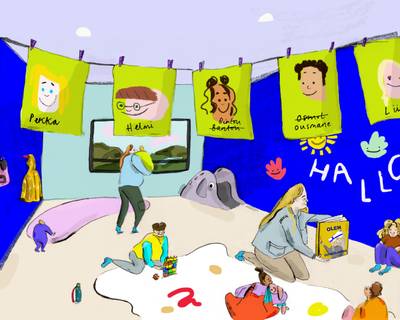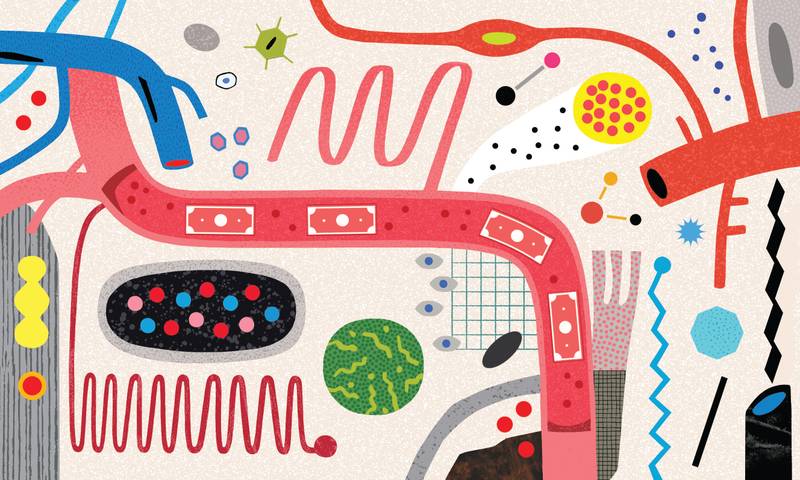

Illustration: Xuan Le
Born in the 80s, educated in the 10s, living in the now. Sami Juhani Rekola tries to recalcitrantly keep bios and himself undefined by using fancy umbrella terms like a post-medium thinker, hands-on explorer and precarity art worker.
Beyond the surface, this is a story about my father and his past relationship with work and money. This is also a story about how some of that history was passed on to me and will eventually bleed through me. Ultimately, this is an essay on the converging paths of the body and those of capitalism. During this essay, I will reveal how I learned to free myself from work when I was 15 and also amuse you with the intricate ways money developed a firm grip on me later as I fell into a wealth trap at 32 years of age. I discuss the adoption and refusal of generational identities regarding work. I’ll try to explicate how events after my father’s death irreversibly changed my relationship towards work, (earning) money and owning. A lot of things were clarified in the inevitable moments following that death, but even more, things turned grey after being black and white for most of my life. I’ll elaborate on how death reveals money, values and hidden battles and how I am not the same person as I was before inherited money flowed in.
During this essay let’s play with the thought of money flowing like blood, as an undetachable part of our corporeality. Let’s picture this flow going through more bodies than just those of our own, maybe even existing as an all-engulfing network of veins of different magnitudes. See global exchange routes with me, both digital and corporeal, consisting of major arteries, smaller blood vessels, pools, clots, crossroads and junctions, all pumping, flowing, stagnating, spilling, spraying and dripping, flowing thick somewhere and running thin elsewhere. As empathetic creatures tied to money as a means for trading, determining and preserving value and that profoundly affecting our agency in the world, I want you to see me bound. To see my symbiosis with the beast.
The roots of my chrometophobia
Let me tell you a little about my father who died in the spring of 2020. His background is in a moderately poor farmer family in a small town in Itä-Häme, near the middle of Finland. He many times mentioned working “every day since he was 15”, so I’ll draw you a picture of a man who had a working man’s identity. I was his only child and from my own experience, I’ll draw you a picture of an absent father. Absent due to working 10-14 hours daily and being more or less tired due to that even on days off. I tell you this not out of bitterness but because I want you to see the buildup of my inheritance and what its price truly is, where it really comes from: how the Finnish dream of a red house and a potato field is also a series of sacrifices a feeling body needs to make. My father was a working man, a truck driver by profession, 71 years of age on his final day. He died alone in his house, lying there dead for two days wearing his workman’s clothes and rubber boots before being found by worried friends who had come to check on him. The cause for his death was a continual buildup of diseases of affluence leading to some sort of failure in the twice-operated area of his heart. During his last months, he suffered from losing his breath easily, an inability to walk for more than 100 meters, loneliness and a fear of dying. He was a person of not much emotional mobility but balanced by an easy-going, amiable social presence. Small-talkative, keen on doing a few beers and innovations around the garage and a regular sight in the social dancing scene during the Finnish summer. He loved his yard, which he crammed with plants to the point it couldn’t seem to breathe.
My father had a varying monthly income of 2000-3000 euros depending on the amount of stress he put his body, his family and his happiness through. This is under the Finnish median pay (2900-3500 euros) but during his adult years, it was enough to buy a car and finally a flat in the town where I’m from. They met with my mother and a long story short, I came along and they bought a house in the city centre, taking out a loan and paying it back together. A red house and a yard (and also later, a not so fertile potato field), schools weren’t far, their jobs were easy to reach, there was stability and predictability. There wasn’t abundance nor was there lack of. For them, there was a backdrop of the Finnish welfare state that provided a link between generations: “there is prosperity if there’s work”. This was the promise given to me as a child. If there’s work there is a way to appear stable enough to get a loan, to get a certain normative economic success that will give one contentment and ease. This promise of gradual accumulation if one is spareful with each coin and doesn’t run into any major personal catastrophes (accidents, addictions, illnesses) was handed to me in small bits as I was growing up. I faced the value of money by not instantly getting what I greedily wanted and by having a scarcity of money in my early days. My body was immersed in lower middle class experiences and was absent from other planes of agency. I learned my limits by feeling what was possible.
A generation free of work
As I got my first job as a summer worker for the city gardening department, I learned that I could get away with doing less, yet seeming like I did more than was expected of me. I had the freedom of mowing the lawns around the city, unmonitored, at my own pace and my daily routine was as follows: I would pick the lawnmower up at a certain location, do a few parks, have lunch at home, come back, do a few more spots and then return the lawnmower to where I picked it up in the first place. They expected us to work for 7 hours daily and they had a certain expectation of how much one worker can do in that time. I found out that my pace of doing the work was way quicker than that of the average, but I also found there not to be a monetary incentive/other rewards to “keep up the good work”, so I started slacking off as much as I could (morally justify). I was 15 at the time and I vividly remember the joy I got after stretching my lunch break from the allowed 60 minutes to nearly 200 minutes on my best days (they were showing multiple rerun episodes of The Prince of Bel Air, a show which I loved to watch while eating) and still when the day was done, I got praise for getting so much lawn mowing done during my shift. This happened multiple times during my summer job month and I concluded from this: why would I do more if I can get away with doing less work? This was the first time I was able to change my hourly wage by taking things more easily. This, in addition to the resistance I felt when an absent father kept going on and on about the importance of money and work like a broken record, made the 15-year old me draw a new picture on top of an old one: money is not actually that important. A view I could easily afford.
The welfare state with its social security features provided me with the unprecedented freedom of detaching myself from the heritage of “earning one’s living”. Also, after becoming an advocate for basic income later in life, I don’t seem to be the only one thinking that living is not something one needs to earn.
I discovered that money is a relationship and ultimately based on trust. Money (appearing to me as wage, profit, value) is a negotiation and one can have a say on the terms of a deal. One can determine the level of effect money has on oneself was my understanding then and in some ways still is, but things did get more complicated on the way. As I dabbled more with work, I tried adopting different roles regarding work ethics and efficiency. I learned to avoid the boss when slacking off and to speed up when I knew that I could get home from work quicker and/or with more income per hour. I learned to avoid certain jobs because I was in the position of not having to work. Work was something I did to try out new things, to get pleasure from achieving new skills, praise and trust. Well also, it got me money to buy things and to, in a way, do more of what I want. My position was historically rare, I later noticed: I’ve never really been desperate for work like my life depended on it. Work has always been optional for me. The welfare state with its social security features provided me with the unprecedented freedom of detaching myself from the heritage of “earning one’s living”. Also, after becoming an advocate for basic income later in life, I don’t seem to be the only one thinking that living is not something one needs to earn.
Then again, how is the welfare state funded? Exactly, with taxes, paid by people who mostly come from different economic times, with different work ethics, different goals for life and boundaries for their utopias. Does one need to respect this and to what extent? My working class parents’ generation (born in the late 40s-mid 50s) had a totally different view of possibilities than me (born in the late 80s). For them, there was the growth fueled by collective national action after the wars in the background and a promise of continuity projected into the horizon: “that’s where we’ll be well off, where we won’t have to worry about the fundamentals of life and where our children will have a more abundant life than we ever could imagine.” It was the ethos of those times that work will make that happen, effort was the road to freedom. Vaguely I felt that this I was expected to learn from my parents’ generation. And what did I do? Refused it first thing in my adult years.
I quickly came up with different ways of assessing whether a job I did was worth the trouble, meaning whether the emotional, time-related and physical stress created by it was correlating with the reward: the amount of money, benefits, freedom, satisfaction and sense of meaning. I had started forming my worker identity using a very different backstory, where other things were more important than mere monetary compensation. I learned about feelings that certain jobs awoke in me: feelings of gratitude, empathy, ease and well-being. For me, it wasn’t about survival anymore. These were things I would imagine were not the core reason for work for my parents. Or if my father drove the truck beyond his physical limits because of those reasons, that was a well-kept secret then. There must have been a fundamental economic background shift due to which I could afford thinking about these things: my relationship to work, the ingrained values of work and the overall sustainability of jobs (both personally and globally). I could choose to work, so therefore I was free of work. I could afford my views as I was not in debt, not driven by money in life, nor was I lacking it so much that it would have a constant degrading effect on my happiness. I was well off as money didn’t have a grip on me.
Energy=Blood=Power=Money
Nobody wants to be “that person”, nobody wants to steal unless they have to, yet some people end up being this person/party either unconsciously or deliberately, sometimes (pseudo-)intelligently explaining their way around it.
I’ll press fast-forward as I talk about energy. Let’s picture all things containing a certain amount of energy. Let’s picture sources of energy: ultimately the sun with its extravagant glow, plants using and benefiting from that light and warmth, then a various interlinked chain of flora and fauna ranging from bacteria and viruses to mammals weighing 110 tons. All this is physical energy contained within cells, organs, bodies, minds and later more complex structures. There’s the concentration of energy somewhere, some parts of the chain have the ability to bind more and more energy into specific locations. Fire becomes a usable force, villages form around lakes abundant with fish, surrounded by forests foraged and hunted for food, minds evolve as nutrients release, people start agriculture, there’s more and more predictable energy available for use. This energy can be also called power at this state. What to do with power now up for grabs? Depending on the users, local land usage providing power can be used for a somewhat self-sustaining co-existence with the surroundings, or growth: aggressive development, continuity, expansion, more energy, more power. Some villages turn into cities, people multiply, bulls turn into tractors, farms into factories, factories into more efficient factories, workers into more efficient workers and somehow some “efficient” bosses turn into slave owners (either literally or figuratively). It’s not about making ends meet, it hasn’t been about that for a long time by this sentence. We are talking about making a profit that is ultimately coming from the amount of surplus value left over after the costs of the worker for the employer. Depending on the thinker, one becomes a capitalist by taking this surplus value and using it for more and more personal growth without letting the worker’s body benefit equally from this surplus. And no matter how devoted a taxpayer a company or a person might be, wealth doesn’t trickle down at the same rate as it gathers up and that creates growing inequality in the economy. This thought is the intellectual birthplace of capitalistic greed: “can I get away with stealing this surplus value and not giving any/just a fraction of it back to the ones that created it in the first place?” Nobody wants to be “that person”, nobody wants to steal unless they have to, yet some people end up being this person/party either unconsciously or deliberately, sometimes (pseudo-)intelligently explaining their way around it.
Let me continue my story and how I might be “that person” and how I definitely am not “that person”. So my parents divorced and shortly after they sold their house. It had somewhat increased in value, but not comparably to for example apartments in Helsinki. That money got split in two after a legal struggle. After living with my mother for a few years until I turned 18, I continued on my journey in life. I tried out jobs, cities, hobbies, travelled the world, skipped the army, thoroughly enjoyed life with less than 1000 euros per month. At this point, I had not seen more than 3000 euros in my bank account. I didn’t understand how people could even spend more than 1500 euros monthly without totally losing their grip on reality. I started to loathe high living standards and accustoming to them seemed dangerous to me. I tried out a few steady jobs that suited me well and brought me gratification but also made me quickly discover that I couldn’t stand routines and monotony when it came to my professional life. I appreciated freedom, the feeling of not being bound, of not being restricted or told what to do and one could say that that was “my main field of study” for the next ten years. Maybe I was inside a bubble, immersed in my own generation’s view of possibilities?
Death is a class trip
My father’s body dies in the spring of 2020. He dies suddenly, leaving me with a bloody stain on a parquet floor, his house, his car, his stuff (he was a hoarder!) and funeral arrangements and estate inventory deeds to be done within a time limit set by someone somewhere. Death is present tense randomness, chaotic and it needs to be dealt with, in order, one thing at a time. Somewhere there is sorrow, but it’s more about the mundane, about the next chair and what to do with it. There is solace and there is crying but there is mostly a useless fucking bunch of trash that needs to be taken into the landfill, given to charity and the rest sold as quickly as possible. I strain my back taking the very last cartful of stuff to the landfill: it’s a twisting movement while discarding old barbells due to which I am barely able to walk or put socks on my feet for two weeks. Death takes its toll on the living bodies as well it seems.
I sell my father’s car after a few trips with it. I sell his house for half the price he paid for it due to bad market times and the lousy location and condition of it. I sell everything to get things back to the kind of normal where I don’t have to take care of anyone else’s stuff: I am a minimalist you see, so feel my pain. All this leaves me with a relatively small five-figure sum of inheritance, so I don’t end up being traditionally rich but it still is more money than I have ever imagined having. I very quickly understand that money doesn’t stay put but instead appears to have a self-destructing feature to it, called inflation, to keep it from stagnating. Money loses its value by roughly 2 percent per year in Finland due to it and with regular savings account interests being zero, one kind of needs to think of something. Interestingly, money seemed to hold its value better when I had less of it. At this point, my father’s money starts to somehow feel mine, even though I have not earned it in any way. My body has zero relationship to this money other than the one I and my father have as family members. Does blood flow to all the members, reaching all extremities fairly? Am I the next gathering pool for my father’s money and power? What is then a fair way of using this power or should I outright refuse it as it is not mine? Is it fair to use it for my gain or should I give it to the ones more in need? Is there a halfway solution where everyone can benefit or is that the same as becoming the beast I had hoped not to become? Is this where young socialists turn into hard-boiled capitalists?
As a so-called educated person with an established critique towards the by-products of capitalism, I thought I had my defenses well built: raise the gates, let the beast in!
Throughout my adult life, I’ve always intellectualized wealth, labor, owning, capital accumulation etc. while having very little personal attachment to any of them. I believe the strongest opinions can only come from such an outsider position. If my body doesn’t feel what it’s like to own a house then I don’t know anything about owning a house. To a certain extent, we are creatures with certain biological backdrops and trigger points that will affect us in certain ways throughout our living days even if we don’t like it or try to intellectualize our way around it. As a so-called educated person with an established critique towards the by-products of capitalism, I thought I had my defenses well built: raise the gates, let the beast in! I was buffed in the sense that I had many intellectual weapons with which to keep up the conversation with it, tactics on how to not die from its claws straight away. I had information on how to tame, seduce, pet and redirect the beast but my body was not prepared. It was scared and vulnerable to the sheer intimidating stenches of money, capital and power coming from the beast’s mouth. After my body was attacked by it, it had me by the hormonal system and I was helpless. My only chance was to feel through what needed to be felt and to learn from that. Beasts never die by killing them (unless we’re writing fairy tales, which we’re not), they die by coexisting with them patiently, intelligently and cunningly until they shrivel up like plants unwatered.
The grip
I became a sustainable investor and I’m still wondering whether that actually can exist or not. I started projecting some kind of techno-optimistic bullshit into the future that I never really bought into before. Death revealed to me that a small part of me believes in a future with automation, robotics, green energy solutions, battery technologies, disrupting innovations and medical cannabis. I learned about ETFs, the macroeconomy, stock graphs and fundamental figures to “manage my funds wisely”. I felt my body throbbing to the pounding of a black heart behind the scenes as the world unraveled into numbers and economical co-dependencies. My body got a taste of how it feels to lose 1000 euros in a day but also learned the joy of earning 1500 euros in minutes as the NYSE stock market opens. The profits “your capital can earn for you” are ridiculous compared to what one can do with one’s body. Looking at the numbers, work just seems stupid compared with investing when it comes to personal economy. Money seems to illuminate other money and also gravitate towards it. After accepting my inheritance, am I now forever bound with the dilemma of how much profit I want to be making and the question of where does that profit come from? Or are these questions always inherently present with money (but invisible with smaller sums)? It takes all effort to keep in mind that this money and the profit it creates is not mine. Yet the “intelligent investing choices I made” make it seem like so. As I open up the stockbroker app on my phone and see the daily market fluctuations, they affect me like it was my body and my money (earned by my work). It’s a whole new understanding of money by feeling it: it’s egoistic and selfish, even to the point of megalomania.
Remember pressing the double-button on a poker machine and losing the win? Remember the greed and the fear that drove that decision? This emotional crossfire exists with all action seeking profit. Even though I know the correlation between bankruptcy numbers and suicide rates, just as a deflating experience, I can’t wait to live and feel through my first financial crisis as I now actually have something to lose. Money can’t be detached from bodies, in the end, they are both bound energy in a longer chain of generous solar outpour. It’s working, sweating (and also non-human) bodies that did the work to birth the value that created the profit, that created more profit, that ultimately created self-absorbed business empires that closed their eyes from any ties to the material reality. Unlike in a fairy tale, digital innovations, robotization, space travel and crypto finance ultimately use the earth as their blood bank. Maybe now and then, a cell wall rips open just as a reminder of this. Every company has a material relationship even though their products might be immaterial. There’s always a physical body using machinery digging the minerals up, someone always has to die if profit is maximized in another part of the world. It is exactly this distance to the “other bodies’’ that are exploited that creates the illusion that there is no immediate danger inscribed in capitalist profit-making. We are far away, so we can afford our views, making it our gamble on the lives of others.
I started to think about my investing strategy through this lense: this inherited money is power given to me by my father (and [in]directly other people, including my mother), my responsibility is in using it for a future I can stand up for publicly and I should try to see where the money goes and how it fetches profit. But even the most sustainable companies can and will do things that fall into grey areas: they for example receive funding from an asset company that deals with some other company in another part of the world whose actions with a certain subcontractor are not 100% sustainable. And I doubt I could even reach all the necessary information inside these chains. Where does one draw the line? Should one refrain from accessing surplus value altogether: live a hand-to-mouth life seeing the arch of every eaten kilojoule in their surroundings and nullifying any transgenerational wealth accumulation possibility after a family member ceases to live? Or walk around with a sack full of inherited cash with an inflation-sized hole to be eligible for an aureole? Is it even possible to welcome wealth and, at the same time, deny its insidious personality- and opinion-altering effects?
Feast of the beast
Maybe I am now possessed, contaminated. It certainly feels as if my dear dichotomies of good and bad are being gnawed away from the inside. This money is starting to feel like mine.
My birth into a lower middle class working family held a surprise promise of a class trip for me in my early 30’s. Maybe it was like a contemporary ghost of capitalism seeking a host? Maybe it had been waiting for me in the shadows? Maybe I am now possessed, contaminated. It certainly feels as if my dear dichotomies of good and bad are being gnawed away from the inside. This money is starting to feel like mine. It feels bad to have it taken away from me. I’m already defending it as if it were mine, but I also feel some shame over it. My father worked over 50 years and had his share of economic growth, moving from the countryside into the city, from a farm to a suburb, moving “up” from poor conditions to a decent earner. He earned every penny and paid for it with his body, carrying a toll on his heart and lungs. The money had some relationship to his work and labour, but it somehow transformed before transferring to me. It moved further from its origins as “a pay for a job well done” and became an abstraction. For me, it is now a concentration of the capitalistic system that we are in, though from a certain viewpoint you could even call it parental love.
There is an undeniable connection between money, bodies and land but yet money can seemingly detach itself from the physical realm. It is mostly not bound locally (to gold reserves for example) by its fundamental nature but instead comes into existence as debt, out of digital air, trusting on promises of certain economic continuities within parties involved: central banks, ordinary deposit banks and the ones taking loans and using the money within the economy. Money is never just my money or your money, it is always national wealth, colonized land, bloody money somewhere along the way. We do not know our money nor can we be free from using it. Money leaves trails, but it also always contains a mystery: we can not totally and honestly track it back to its original birthplaces (the workers’ bodies) inside global markets anymore. There is always a blank spot and some memory loss along the way. Maybe the most satisfying catharses only happen in fairy tales, which this is not. My soul might stay abyss black like Pepsi Max while my intentions glow Apple white. But grey blood, grey money and grey opinions don’t quench our thirst for action. The spectators cheer me up as they watch the show: beast in the corner, me stumbling in the middle, scarring and healing. All patiently waiting. Merging and aching.
